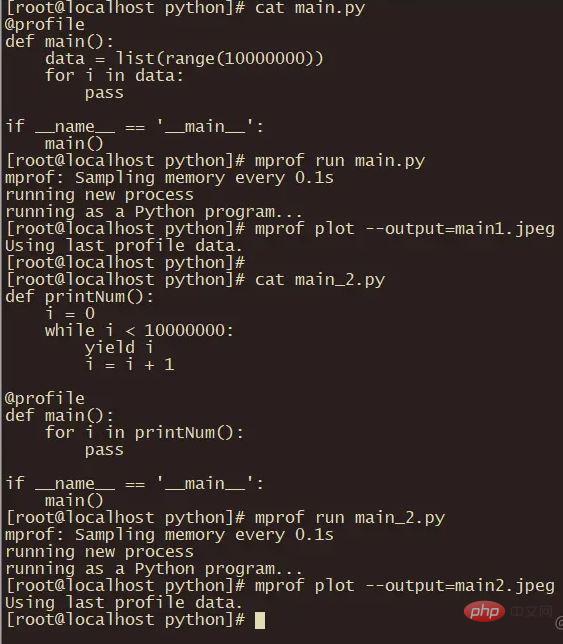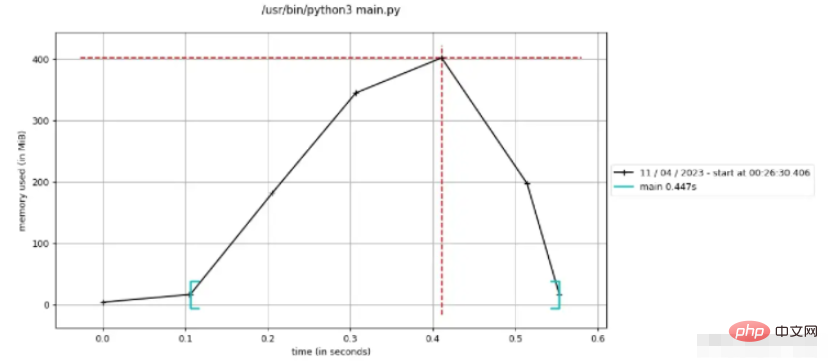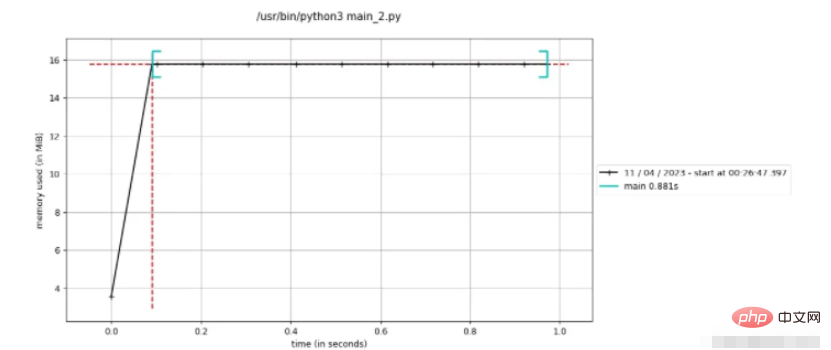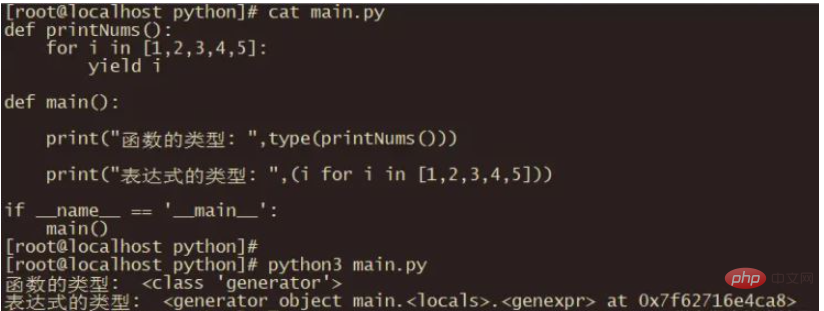How do generators in Python work?
What is a python generator
The generator is a special iterator. It also has the __iter__ method and the __next__ method inside it. When terminating the generator Sometimes, the StopIteration exception will still be thrown to exit the loop, but compared to the iterator, the generator also has the feature of saving the "intermediate value". The next time it runs, it will also use this " Intermediate value" to operate. The keyword of the generator is yield. Let’s write the simplest generator below.
#!/usr/bin/env python
def printNums():
i = 0
while i<10:
yield i
i = i + 1
def main():
for i in printNums():
print(i)
if __name__ == '__main__':
main() If you look at the code at a glance, you may wonder what this is. Why don’t you just use range to generate it instead of using yield? Oh, don’t worry. , let’s go on to see why a generator is needed, or what problem the generator solves.
Why python generator is needed
Before explaining this problem, let’s first write a requirement to output data within 0-10000000, and then run to view the screenshot of the exported memory operation.
Auxiliary instructions for calling python program memory information
Here you can use the memory_profiler module of python to detect the occupancy of program memory.
Installationmemory_profilerLibrary:
pip3 install memory_profiler
The method of use is very simple. Just add the @profile decorator before the function or code that needs to be detected. , for example:
@profile
def main():
passGenerate .dat file
mprof run
Export icon, you can use
mprof plot --output=filename
python case code
The following two programs both output data between 0-9999999. The difference is that the first program uses range and then append into list, while the second one uses an iterator to generate the data.
main.pyProgram
@profile
def main():
data = list(range(10000000))
for i in data:
pass
if __name__ == '__main__':
main()main_2.pyProgram
def printNum():
i = 0
while i < 10000000:
yield i
i = i + 1
@profile
def main():
for i in printNum():
pass
if __name__ == '__main__':
main()Running program
The code is also there Now, you can run the program as above and export the memory information

View the memory information after running
main.py Running memory graph

main_2.py Running memory graph

Comparison of the above 2 pictures , when we superimpose the data into the list and then output it, it takes up nearly 400M of memory, while using an iterator to calculate the next value only uses 16M of memory.
Through the above cases, we should know why we should use generators.
Python generator principle
Since the generator expression yield statement involves the internal mechanism of python interpretation rights, it is difficult to view its source code. It is difficult to obtain its principle, but we can use the pause mechanism of yield to explore the generator.
You can write the following code:
def testGenerator():
print("进入生成器")
yield "pdudo"
print("第一次输出")
yield "juejin"
print("第二次输出")
def main():
xx = testGenerator()
print(next(xx))
print(next(xx))
if __name__ == '__main__':
main()The effect after operation is as follows

Through the above example, combined with the operation of the following generator The process will deepen the feeling of the generator.
When python encounters the yield statement, the running status of the current function will be recorded, execution will be suspended, and the result will be thrown. It will continue to wait for the next call to the __next__ method. After this method is called, the function will resume running until the next yield statement or the end of the function. There will be no yield# at the end of the execution. ##When the function is executable, StopIteration will be thrown to mark the end of the generator.
python, in addition to being written in a function and returned using yield, the generator can also be used directly Generator expressions, eh. . . It may be abstract, but if you look at the code below, you'll understand.
def printNums():
for i in [1,2,3,4,5]:
yield i
def main():
for i in printNums():
print(i)
gener = (i for i in [1,2,3,4,5])
for i in gener:
print(i)
if __name__ == '__main__':
main()(i for i in [1,2,3,4,5]) is equivalent to the printNums function, and its types are generated Container, we can use type to print it out and take a look.

The above is the detailed content of How do generators in Python work?. For more information, please follow other related articles on the PHP Chinese website!

Hot AI Tools

Undresser.AI Undress
AI-powered app for creating realistic nude photos

AI Clothes Remover
Online AI tool for removing clothes from photos.

Undress AI Tool
Undress images for free

Clothoff.io
AI clothes remover

AI Hentai Generator
Generate AI Hentai for free.

Hot Article

Hot Tools

Notepad++7.3.1
Easy-to-use and free code editor

SublimeText3 Chinese version
Chinese version, very easy to use

Zend Studio 13.0.1
Powerful PHP integrated development environment

Dreamweaver CS6
Visual web development tools

SublimeText3 Mac version
God-level code editing software (SublimeText3)

Hot Topics
 1386
1386
 52
52
 PHP and Python: Code Examples and Comparison
Apr 15, 2025 am 12:07 AM
PHP and Python: Code Examples and Comparison
Apr 15, 2025 am 12:07 AM
PHP and Python have their own advantages and disadvantages, and the choice depends on project needs and personal preferences. 1.PHP is suitable for rapid development and maintenance of large-scale web applications. 2. Python dominates the field of data science and machine learning.
 Python vs. JavaScript: Community, Libraries, and Resources
Apr 15, 2025 am 12:16 AM
Python vs. JavaScript: Community, Libraries, and Resources
Apr 15, 2025 am 12:16 AM
Python and JavaScript have their own advantages and disadvantages in terms of community, libraries and resources. 1) The Python community is friendly and suitable for beginners, but the front-end development resources are not as rich as JavaScript. 2) Python is powerful in data science and machine learning libraries, while JavaScript is better in front-end development libraries and frameworks. 3) Both have rich learning resources, but Python is suitable for starting with official documents, while JavaScript is better with MDNWebDocs. The choice should be based on project needs and personal interests.
 Detailed explanation of docker principle
Apr 14, 2025 pm 11:57 PM
Detailed explanation of docker principle
Apr 14, 2025 pm 11:57 PM
Docker uses Linux kernel features to provide an efficient and isolated application running environment. Its working principle is as follows: 1. The mirror is used as a read-only template, which contains everything you need to run the application; 2. The Union File System (UnionFS) stacks multiple file systems, only storing the differences, saving space and speeding up; 3. The daemon manages the mirrors and containers, and the client uses them for interaction; 4. Namespaces and cgroups implement container isolation and resource limitations; 5. Multiple network modes support container interconnection. Only by understanding these core concepts can you better utilize Docker.
 How to run programs in terminal vscode
Apr 15, 2025 pm 06:42 PM
How to run programs in terminal vscode
Apr 15, 2025 pm 06:42 PM
In VS Code, you can run the program in the terminal through the following steps: Prepare the code and open the integrated terminal to ensure that the code directory is consistent with the terminal working directory. Select the run command according to the programming language (such as Python's python your_file_name.py) to check whether it runs successfully and resolve errors. Use the debugger to improve debugging efficiency.
 Can visual studio code be used in python
Apr 15, 2025 pm 08:18 PM
Can visual studio code be used in python
Apr 15, 2025 pm 08:18 PM
VS Code can be used to write Python and provides many features that make it an ideal tool for developing Python applications. It allows users to: install Python extensions to get functions such as code completion, syntax highlighting, and debugging. Use the debugger to track code step by step, find and fix errors. Integrate Git for version control. Use code formatting tools to maintain code consistency. Use the Linting tool to spot potential problems ahead of time.
 Python: Automation, Scripting, and Task Management
Apr 16, 2025 am 12:14 AM
Python: Automation, Scripting, and Task Management
Apr 16, 2025 am 12:14 AM
Python excels in automation, scripting, and task management. 1) Automation: File backup is realized through standard libraries such as os and shutil. 2) Script writing: Use the psutil library to monitor system resources. 3) Task management: Use the schedule library to schedule tasks. Python's ease of use and rich library support makes it the preferred tool in these areas.
 Can vs code run in Windows 8
Apr 15, 2025 pm 07:24 PM
Can vs code run in Windows 8
Apr 15, 2025 pm 07:24 PM
VS Code can run on Windows 8, but the experience may not be great. First make sure the system has been updated to the latest patch, then download the VS Code installation package that matches the system architecture and install it as prompted. After installation, be aware that some extensions may be incompatible with Windows 8 and need to look for alternative extensions or use newer Windows systems in a virtual machine. Install the necessary extensions to check whether they work properly. Although VS Code is feasible on Windows 8, it is recommended to upgrade to a newer Windows system for a better development experience and security.
 Is the vscode extension malicious?
Apr 15, 2025 pm 07:57 PM
Is the vscode extension malicious?
Apr 15, 2025 pm 07:57 PM
VS Code extensions pose malicious risks, such as hiding malicious code, exploiting vulnerabilities, and masturbating as legitimate extensions. Methods to identify malicious extensions include: checking publishers, reading comments, checking code, and installing with caution. Security measures also include: security awareness, good habits, regular updates and antivirus software.




